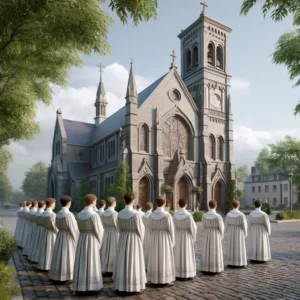Clergy Sex Abuse Survivors Demand Acknowledgment and Justice
Emotions ran high as eight sexual abuse survivors shared their stories during a hearing in the Archdiocese of Baltimore’s bankruptcy case on Monday. The testimonies painted a disturbing picture of the lasting impact of clergy sex abuse on the lives of the victims.
5 Key Points
- Survivors recounted being abused in schools, rectories, and priests’ homes.
- Many felt confused and were told to keep the abuse secret by their abusers.
- The clergy sex abuse led to substance disorders, loss of faith, trust issues, and isolation.
- The archdiocese faces an estimated 320 claims from abuse survivors.
- The bankruptcy case aims to fairly compensate victims while allowing the archdiocese to continue its mission.
Confronting the Archbishop
A 58-year-old woman, visibly shaken, directed her testimony toward Archbishop William Lori, demanding acknowledgment for her suffering. She shared the devastating impact of the abuse on her life, including PTSD, anxiety, depression, and panic attacks. The woman expressed anger at the church’s inadequate response when she reported her abuse.
“Do you see me now?” she cried toward Archbishop Lori. “Do I matter to you now? I suffer from PTSD, from anxiety, from depression and panic attacks. I’m on disability. It will take me days to recover from talking today. I hope you have heard my truth and feel the pain I have struggled with.”
Though she shared few details of her abuse, the woman was graphic about how the scars it left on her destroyed her ability to tell right from wrong and led to a life of “horrible decisions,” promiscuity, substance abuse, eating disorders, persistent nightmares, and abusive relationships.
Lifelong Struggles
Mark Easley, who found solace in the church during the Civil Rights Movement, testified about being abused by a trusted priest at the age of 6 or 7. The abuse left him unable to finish high school, struggle with friendships, and led to a life of solitude.
Easley recalled how the pastor of St. Vincent de Paul Church, Edmund Stroup, gained his mother’s trust and invited him and his brother to spend nights at the church. Stroup brought them to the rectory, where there was only one bed, and told the children to change into pajamas. The priest then emerged naked from the bathroom.
“I viewed this man as one of God’s messengers. It was the first time I saw him with his collar off,” Easley said. The abuse, he testified, “sentenced me to a life of solitude.”
Seeking Justice
Teresa Lancaster, a sexual abuse survivor and victims’ advocate, criticized the archdiocese’s bankruptcy filing, calling it a “farce” and questioning the church’s empathy for survivors. She believes the bankruptcy is an attempt to impede survivors’ search for justice.
“They say they care? I do not believe it. I do not believe it for one minute,” Lancaster told reporters. “And this bankruptcy is a farce. They declared bankruptcy before any claims were filed.”
The archdiocese filed for bankruptcy on Sept. 29, two days before the Child Victims Act took effect in Maryland. The law abolished time limits for people sexually abused as children to sue their abusers and the institutions that enabled their suffering.
Breaking the Silence
Rebecca, a member of the survivor’s committee, shared her story of being cornered and raped by an archdiocesan employee at her Catholic school when she was 12. The abuse led her to switch schools, struggle with substance abuse, and attempt suicide. Through writing, Rebecca discovered that the abuse was not her fault and hopes that by sharing her story, she can help save other children from similar trauma.
“So now to my abuser, you put my life on hold,” she read from a poem she wrote titled “To My Abuser.” “But if my story can save at least one little child, then I’m glad it has been told.”
Monday’s hearing comes less than two weeks ahead of the May 31 deadline for sex abuse survivors to file claims against the archdiocese in bankruptcy court. As of Monday, an estimated 320 such claims were filed in the case, according to Paul Jan Zdunek, chair of the survivors committee.
The archdiocese has said that by filing for bankruptcy, it sought to protect its assets and limit its legal liability while being able to fairly compensate the estimated hundreds of clergy sex abuse survivors with civil claims rather than pay inordinate sums to only a few, allowing the archdiocese to carry forward with its mission.
However, survivors and their advocates remain skeptical of the church’s intentions. They argue that if the archdiocese truly empathized with those who suffered clergy sex abuse, it would not be trying to impede their search for justice through the bankruptcy process.
As the May 31 deadline approaches, more survivors are expected to come forward with their stories and file claims against the archdiocese. The bankruptcy case will continue to unfold, to fairly compensate victims while allowing the archdiocese to move forward. For the survivors who bravely testified on Monday, sharing their experiences is a crucial step in their healing process and in holding the church accountable for the abuse they suffered.
Clergy Abuse FAQ
Do you qualify for the Clergy Abuse Lawsuit?
To see if you qualify for Clergy Abuse Lawsuit.
What is the purpose of the bankruptcy case?
The Archdiocese of Baltimore filed for bankruptcy to protect its assets, limit legal liability, and fairly compensate the estimated hundreds of survivors with civil claims while allowing the archdiocese to continue its mission.
How many claims have been filed against the archdiocese?
As of Monday, there were an estimated 320 claims filed by sex abuse survivors in the bankruptcy case.
What impact did the Child Victims Act have on survivors?
The Child Victims Act, enacted in April 2023, abolished time limits for people sexually abused as children to sue their abusers and the institutions that enabled their suffering, giving survivors a chance to seek redress.
How did Archbishop William Lori respond to the testimonies?
Archbishop Lori maintained eye contact with the survivors throughout their testimonies and said that listening to their stories, though difficult, is part of what he hopes is a healing process.
What common themes emerged from the survivors’ testimonies?
Survivors shared stories of being abused by trusted clergy members, feeling confused and silenced, and struggling with lifelong impacts such as substance abuse, loss of faith, and mental health issues.
Citation:
Mann, A., & Pitts, J. M. (2024, May 22). Clergy abuse survivors testify in Catholic church bankruptcy case: ‘Do you see me now?’ The Baltimore Sun





